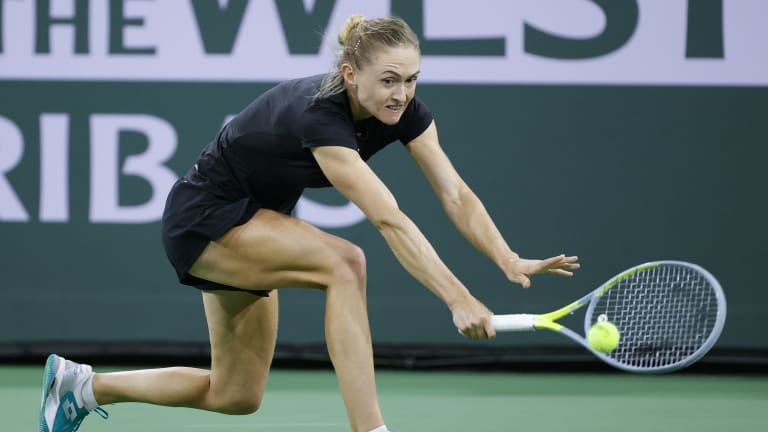On what’s arguably the slowest hard court on the planet, Sasnovich proved far more adept at calibrating aggression and prudence, raw footspeed and the more nuanced discipline of footwork. Her shot selection was exemplary, an adroit mix of crosscourt and down-the-line drives that repeatedly pinned Raducanu, elicited errors and generated opportunities to strike winners. One telling data point: Raducanu won only five of 21 points on her second serve. Said Raducanu, “What do I need to work on? I mean, I'll probably just go back and review the match probably tomorrow when I can look at it with a clear head.”
Next up for Sasnovich is Simona Halep, who won their only previous match, a tight 6-4, 7-5 victory in the first round of Wimbledon two years ago. For this experienced Belarussian, matters of time and space are primarily confined to the battles that take place inside the lines and between the ears, the latter an area Sasnovich admits to managing quite delicately. “A lot people will tell you bad things,” she said. “But I don't want to listen these bad things. I know about them, for example, in my tennis. I want to be be in good mood, in positive mood.”
But for Raducanu, the implications of victories and defeats have become entirely different. No matter where the player is from, to win a Grand Slam title at such a young age is a daunting experience. But to be a British player and earn that kind of victory takes public fascination and fishbowl-like dissection to new levels. This, after all, was the nation that invented tennis, a country that houses the sport’s most prestigious tournament, a literate land of high-minded columnists and dirt-dishing tabloids.
The rewards that accompany spectacular achievement are already coming Raducanu’s way. And so too will come the examinations, every step she takes probed deeply. Will those British tabloids that know little of tennis grasp that Indian Wells is only the fifth WTA tournament and second night match of Raducanu’s career? Will they understand how skilled and savvy Sasnovich is, that her current triple-digit ranking is 70 spots below her career high? As Raducanu said, Sasnovich has “probably been 4-2 down like hundreds of times.”
In the weeks to come, it will be intriguing to see what direction Raducanu takes on the coaching front. Former pro Jeremy Bates was in her camp this week, Raducanu’s third coach of the year. Does Bates stay or will Raducanu commence work with someone new? How will she balance endorsements with tennis?
In the wake of losses and many more tough matches that will surely be part of her learning curve, Raducanu must now continually grapple with life as both public figure and young athlete. As she said, “it's going to take me time to adjust really to what's going on. I mean, I'm still so new to everything. Like the experiences that I'm going through right now, even though I might not feel 100 percent amazing right now, I know they're for the greater good. For the bigger picture, I'll be thanking this moment. So, yeah, that's the lesson I think, that you can easily get sucked into being so focused on the result and getting disappointed. I mean, I'm 18 years old. I need to cut myself some slack, so yeah.”
Indeed, time is clearly on Raducanu’s side. May all continue to grant her space.
